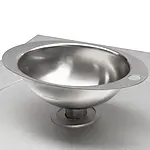










Bilingual Technical Support (EN / ES)
Public Service, Military and First Responder Discount
30 Day Return Policy
2 Year Warranty
Free Standard Shipping (US)
Plastometer up to 400°C (752°F) / melting rate up to 400.0 g/10 min
high temperature stability / weights included / 7" TFT touch display
The Plastometer from PCE Instruments is used for fast testing of the melt mass flow rate of plastics. The plastometer is suitable for incoming inspection as well as for production monitoring. Due to the clear presentation of all relevant parameters on the display, the results of the melt index test can be displayed in a short time with the help of the plastometer. 
Stored standard plastics save the user of the plastometer configuration procedures. The stored plastics include: Polystyrene (PS), Polypropylene (PP), Polyethylene (PE), ABS, Polycarbonate (PC), Polymethylmethacrylate (PMMA), POM, MABS, SAN, E/VAC and others. In addition to the already integrated standard plastics, the test temperatures and test weights according to the standard (ISO 1133) are stored in the plastometer. Plastics with material-specific parameters that are not stored can be permanently added and saved in the plastometer as required.
The plastometer is therefore very well suited for determining the melt flow index rate, which provides information about the flow behaviour or viscosity of plastics at different temperatures and pressures. During this melt flow index test according to ISO 1133, the plastic granulate sample is placed in a preheated cylinder. In the cylinder, the granulate is heated at a material-specific temperature. A piston with a defined mass presses the liquefied melt through a nozzle with a defined diameter by its own weight and an additional weight. After a defined time, the measurement on the plastometer is stopped. 
The PCE-MFI 400 plastometer from PCE Instruments is therefore a suitable instrument for determining the melt mass flow rate for a wide range of thermoplastics. In this way, important parameters for subsequent production can be determined and adjusted prior to manufacture. In this way, the plastometer ensures sustainable quality improvements in the production process, reduces rejects and thus contributes to a sustainable cost reduction.
- Various weights included
***220 VAC only: 110:220 (5000 Watt) Transformer included for US customers
| Measuring range | |
| Melting rate | 0.1 ... 400.0 g / 10 min |
| Temperature | 120 ... 400°C / 248 ... 752°F |
| Measuring accuracy temperature | ± 0.2°C / 0.36°F |
| Resolution | 0.1°C / 0.18°F |
| Test load | 0.325 ... 21.6 kg |
| Test piston Ø | 9.48 mm |
| Capillary Ø | 2,095 mm |
| Standards | ISO1133-1997, ASTM 1238-04C, GB / T3682-2000 |
| Display | |
| Type | 7" LCD touch display |
| Resolution | 800 x 480 pixels |
| Color depth | 16,000 colors |
| Dimensions (without test load) | 500 x 320 x 500 mm / 19.7 x 12.6 x 19.7 in |
| Weight (without test load) | About 15 kg / 33 lbs |
| Power supply | 90 ... 264V AC |
| Power consumption (at full load) | About 0.6 kVA |